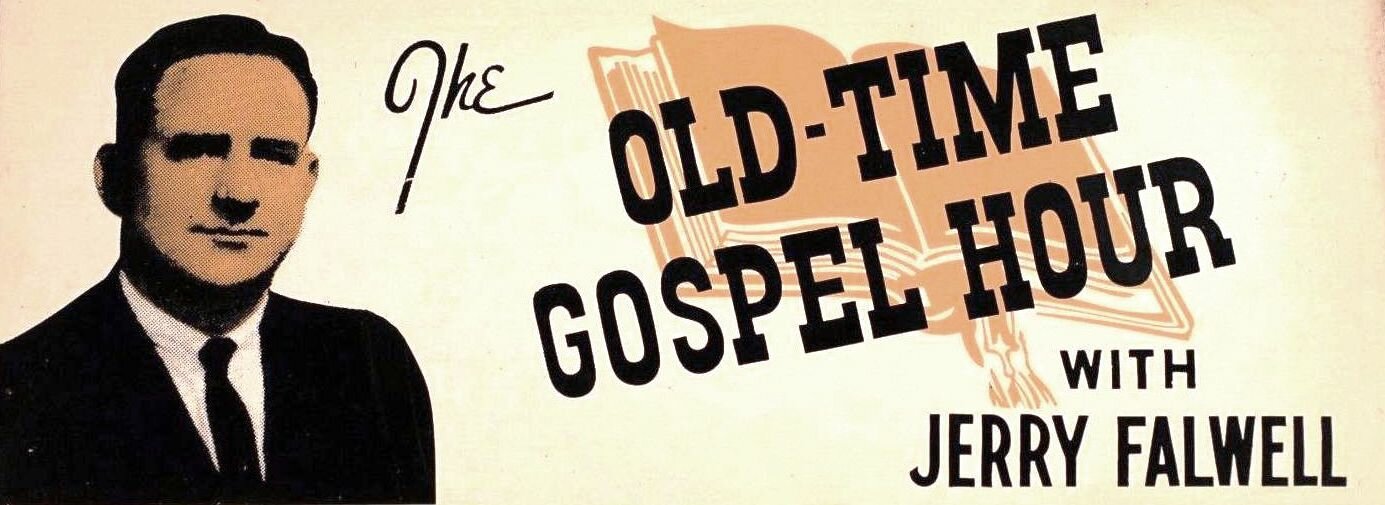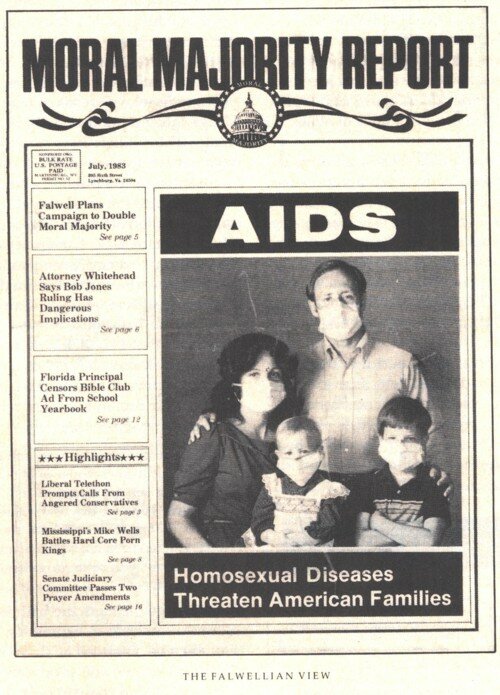East Of Eden
"A curious mix of the relevant and reverential"
East of Eden
The Preachers: Jerry Falwell, Sr.: Part 2

President Ronald Reagan and Reverend Falwell. (Image Source)
When last we left off on Falwell, it was the mid-60's, his Thomas Road Baptist Church was growing, and he was staunchly against the Civil Rights Movement, integration, and Christian leaders, like Dr. Martin Luther King, Jr., who was actively involved in politics. Falwell would eventually change his mind on the first two, but rather quickly changed course on the whole politics-stuff.

(Image via IMDB)
In 1967, Falwell opened Lynchburg Christian Academy (now called Liberty Christian Academy), just in time for little Jerry, Jr., to begin school. He also worked to greatly expand the reach of his ministry in the late 60's and early 1970's through mail and broadcast. The Old Time Gospel Hour, a television show (originally on just radio) began in 1956 which broadcasted Thomas Road's services, was added to more and more TV stations. Falwell quickly went from being a local preacher to a nationally prominent televangelist. In order to make this transition, Fallwell did have to make some changes. From The Evangelicals: The Struggle to Shape America by Frances Fitzgerald:
“To find backers and to promote the show Falwell traveled the country every week in a succession of ever-larger and ever-faster church-owned airplanes, speaking at churches, Bible schools, pastors’ conferences, and revivals.
His stable of writers turned out sermons, pamphlets, books, and magazines. Pastors were important to his enterprise, and along the way he met hundreds of them, many from the fundamentalist Baptist networks, such as the Baptist Bible Fellowship and those of Bob Jones Jr. and John R. Rice. In the early 1970s he and his associate Elmer Towns wrote sermons and two books on church growth for them. In the sermons, he urged them to stop fighting over minute ecclesiastical or doctrinal differences and to unite for the sake of evangelism.
This was in his interests as a TV evangelist, and according to former associates he eventually discovered that he could reach a far wider audience by talking about “family” issues than by talking theology. In any case, around the mid-1970s the emphasis of his preaching changed”.

Falwell backed by Liberty singers. (Image Source)
In 1971, Falwell founded Liberty Baptist College (now Liberty University), and in '75 and '76, took the school's chorale on the road with him while doing fundraising work. They helped advertise the fledgling institution and provided great entertainment.The '76 tour had a special flavor:
[During] “the nation’s Bicentennial, he led a much more extensive tour with busloads of LBC singers, this one dubbed “I Love America.” At rallies with American flags flying behind them, his students sang religious and patriotic songs, and he delivered a rousing stump sermon calling upon America to return to God”.
“Falwell’s timing was serendipitous, for 1976 was also a presidential election year, and evangelicals were constantly in the news. The Democratic presidential nominee, Jimmy Carter, was a devout Southern Baptist, a deacon of his church, and a Sunday school teacher, who spoke frankly about his “born-again” experience. President Gerald Ford, an Episcopalian, described himself as a born-again, and in competition with Carter for the South, he became the first sitting president to address the SBC convention. Charles Colson, one of the Watergate conspirators, emerged from prison with a best-selling memoir, Born Again. CBS did a prime-time documentary of the same title, and all the leading national magazines ran feature stories on evangelicals. A Gallup poll queried Americans about their faith and found that over a third described themselves as “born-again” Christians. An additional third—which translated into fifty million adult Americans—agreed that “the Bible is the actual word of God to be taken literally, word for word.” Citing the poll, a Newsweek cover story of October 25 called “the emergence of evangelical Christianity into a position of respect and power” the “most significant—and overlooked—religious phenomenon of the ’70s.” The publicity gave “fundamentalists, Pentecostals, Southern Baptists, and other evangelicals a sense of their collective importance, and many leaders, including Falwell, cited the Gallup poll as evidence that evangelicals had become the largest religious group in the country.”
I find it funny how when pop culture often looks back at the 1970's, it's chock full of Vietnam, Nixon, afros, Disco music, bell bottoms, cocaine and clips of SNL and Norman Lear TV shows. But the growth in Born Again/ Evangelical Christianity- and it's televangelists, books, and music seems to be ignored. Still, there's no denying their impact when a few years later Ronald Reagan made a run for the White House.
“IN JUNE 1979 Jerry Falwell launched the Moral Majority, an organization designed to register conservative Christians and mobilize them into a political force against what he called “secular humanism” and the moral decay of the country. “We are fighting a holy war,” he said, “and this time we are going to win.”
...
“On April 29, 1980, Pat Robertson of the Christian Broadcasting Network and Bill Bright of Campus Crusade for Christ cochaired a Washington for Jesus rally, assembling somewhere between a quarter- and a half-million conservative Christians, many of them Pentescostals and charismatics, on the Washington Mall. A number of the speakers predicted that abortion, homosexuality, and the banning of school prayer would bring God’s wrath upon the country. “Unless we repent and turn from our sin,” Bright thundered, “we can expect to be destroyed.” According to some, the weakening of America’s moral fiber and of its military defense was inviting a Soviet attack. “The scream of the great American eagle has turned into the twitter of a frightened sparrow,” Adrian Rogers declared. Later the organizers divided the marchers by congressional districts and encouraged them to participate in politics.”
“Our goal is to influence all viable [presidential] candidates on issues important to the church. We want answers. We want appointments to government,” Jim Bakker told a reporter in November 1979. “We have together, with the Protestants and Catholics, enough votes to run the country,” Pat Robertson said.
Others, such as Adrian Rogers and Bill Bright, claimed they had no political agenda—that they were merely speaking to the moral crisis in the land. Still, all had much the same message, and one that clearly favored Ronald Reagan and other conservative candidates.”

A copy of a July 1983 issue of Moral Majority Report. Whew, child, the hysteria. (Image Source)
Falwell, along with other high profile Christian leaders of various denominations were determined to right the course of the bad ship America, taking down abortion, homosexuality, feminism, pornography, and many other forms of unGodliness. But Falwell quickly became the most prominent leader of the new Neo-Con Christian Crusade. As the 70's wound down, there were more and more reasons for Falwell to align with the GOP over the Dems. There was a change to the Republican platform in 1976 that stated: "The Republican Party favors a continuance of the public dialogue on abortion and supports the efforts of those who seek enactment of a constitutional amendment to restore the protection of life to unborn children.” Meanwhile, Jimmy Carter, while personally opposed to abortion, ultimately took a pro-choice position. In 1978, the IRS planned to revoke the tax-exempt status of private schools that failed to meet certain standards of racial integration. Yeah, over two decades after Brown vs. Board of Education, private, Christian segregation academies were keeping the hope and practice of white supremacy alive. Anyway, because this plan came down during Carter's time as POTUS, he was ultimately blamed by many angry Christians- including Falwell who had his own academy of which to worry. The IRS wound up dropping this push after receiving a deluge of angry letters, prompted by Christian radio, TV and newsletters.
In 1980, Falwell released the strongly punctuated Listen, America!, listing the evils of welfare and food stamps while trumpeting the threat of Cold War Communism. Which pretty much sounds like it could be the GOP bible of the 80's, just with references to the actual Bible.
“In Listen, America! he maintained that Rome fell when it descended into corruption and warned that this country was on a similar path to destruction. America, he preached, was a Christian nation, settled by people seeking religious freedom and founded by “deeply religious men” who had fought heroically to free the country and establish a nation “under God.” But Americans had turned away from their heritage of freedom and the faith of their fathers, and sin permeated the land. The decline began long ago (the 1930s was the period Falwell looked back to with nostalgia) but the real plunge came in the 1960s and ’70s. America now faced the most serious crisis in its history, and Christians must act or lose their freedom.”
I want to contrast his words in Listen, America! to his words in the "Ministers and Marches" sermon from 15 years prior. He had done a total about face; where he had once deemed political action by Christians sinful, he then declared it an absolute necessity. Salvation was not in seperating from the world, but by actively going out and fighting to save it. Not only is this a change in Falwell's world because of his outsized influence as a televangelist leader, but as author Frances Fitzgerald points out in The Evangelicals, a change in Christian Evangelical America.
Reagan would, of course, go on to beat Carter handily, and for a few years, it did seem as if the Moral Majority was a force to be reckoned with... but by 1987, Falwell had pretty much shut it down:
“Still, Falwell had done something far more important: he had played the lead role in founding a political movement. In the late 1970s he and his allies had ridden the growing wave of fundamentalism in the Sunbelt and steered it into national politics by harnessing the sense of cultural breakdown that resulted from the social revolution of the 1960s and the urbanization of the South. Along the way, Falwell had provided a new political agenda and the justification separatist Baptists were looking for to join the national debate. Not all at once but gradually, he led the most marginalized of religious groups into mainstream politics. Further, he and his fellows started the process of convincing fundamentalists, Pentecostals, and conservative Southern Baptists that they and others could work for common goals without compromising their theology or even making a formal alliance. In addition, he introduced the fundamentalist sense of perpetual crisis, and of war between the forces of good and evil, into national politics, where the rhetoric has remained ever since.”
And that is undoubtedly true. We see it today in how White Evangelicals support President Trump in such high numbers. We see it in the words of Franklin Graham, son of Billy, and in Falwell's firstborn and heir, Jerry, Jr.
After the Moral Majority floundered, Falwell stayed busy trying but failing to save Jim Bakker's messy ministry, which I wrote about here. He also remained active at Thomas Road, but really put a great deal of time, money and energy into building Liberty University, which has become a popular choice for thousands seeking online educational options.
Falwell spent the last moments of his life at his beloved Liberty, going into cardiac arrest in his campus office on May 15, 2007. He was pronounced dead at a nearby hospital at 12:40 P.M. His legacy continues on.
